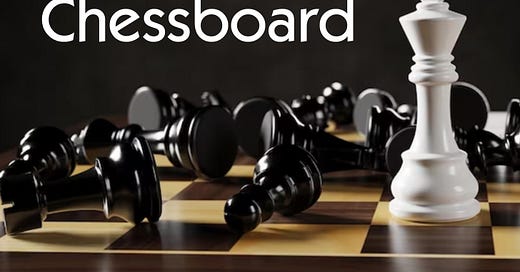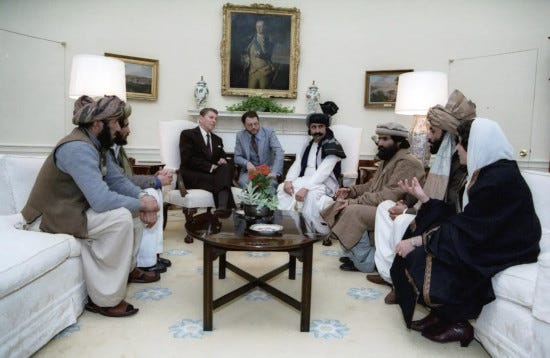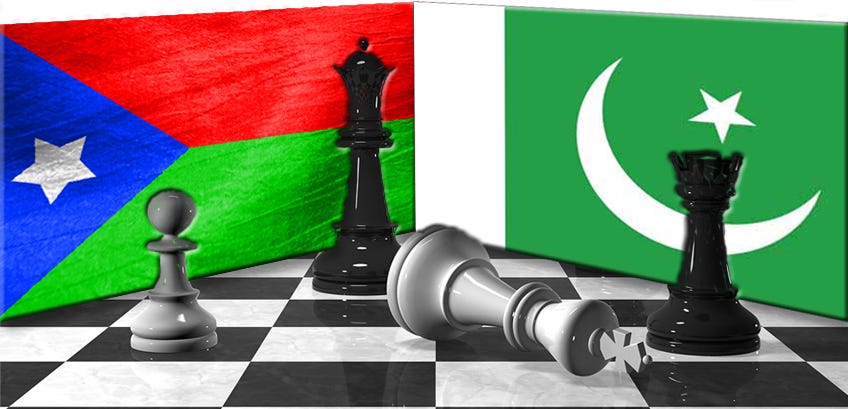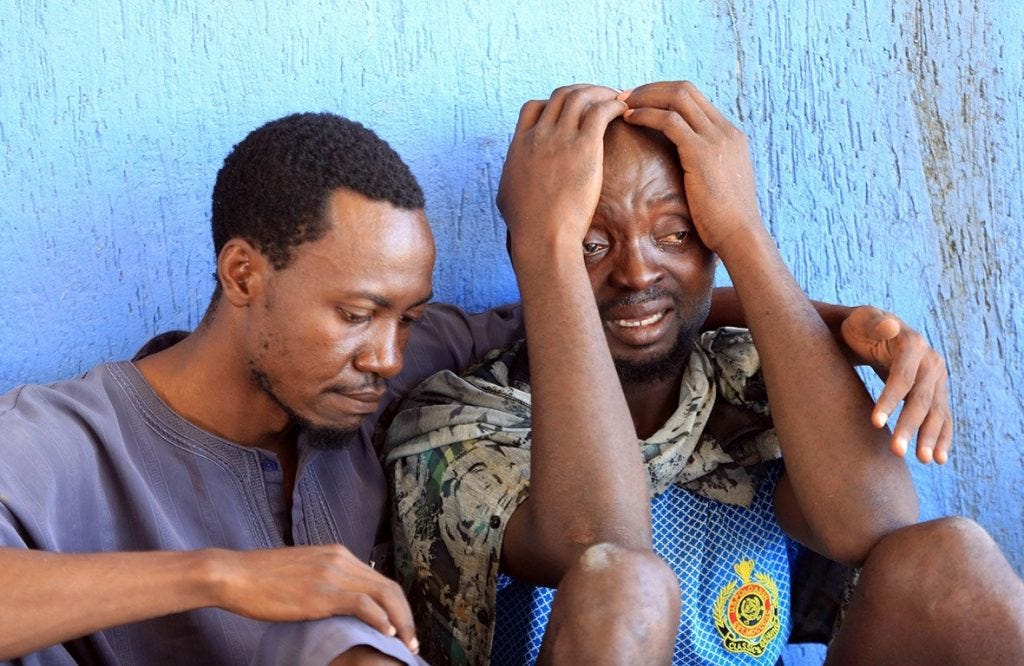by James Corbett
corbettreport.com
July 16, 2023
The observation that the great geopolitical struggle between nations is akin to a grand game of chess is hardly a novel one.
After all, Khosrau II, the ancient Sasanian king, saw the connection over 1,400 years ago: "If a ruler does not understand chess, how can he rule over a kingdom?"
Or take Leo Tolstoy's conclusion, "War is like a game of chess."
And who in The Corbett Report audience could forget Zbigniew Brzezinski's infamous 1998 tome, The Grand Chessboard, in which he identified the Eurasian landmass as "the chessboard on which the struggle for global primacy continues to be played"?
That geopolitical strife has been so often analogized to a game of chess should hardly be surprising. After all, chess itself derives from an Indian strategy board game, chaturanga, whose pieces were modeled on the ranks of the ancient Indian army. In fact, the first modern war game was a type of chess game played on a purpose-built board made of 1,666 squares.
Given this age-old metaphor, who could doubt that the powers-that-shouldn't-be really do imagine themselves as grandmasters, moving people around like chess pieces in order to conquer this or that square on the grand chessboard? And, keeping to the logic of this twisted metaphor, it follows that if geopolitics really is a game of chess, then the people at the bottom of the power pyramid are merely pieces on that board, pawns to be sacrificed as part of a gambit in a larger battle for control of the global chessboard.
Today I will tell the story of these pawns on the chessboard and how they have been used, abused and discarded by the would-be rulers of the world.
Afghans
There is perhaps no better exemplar of the chess/politics analogy than the country of Afghanistan. Conveniently situated on the main land route between Iran, Central Asia and India, Afghanistan has long been recognized as a key square on the geopolitical chessboard. For millennia, the Afghans have found themselves in the crosshairs of empires, from the Macedonians to the Mongols, the Seleucids to the Sikhs, and many others besides.
In the 19th century, British strategists came to covet this particular square of the chessboard, recognizing its utility as a buffer between the Russian Empire and the crown jewel of the British Empire: India. Britain's interest in Afghanistan led to a century-long covert proxy war in the country that pitted the Brits against the Russians in a struggle for control of that buffer nation. Known as The Great Game, this struggle resulted in not one, not two, but three wars between the British Empire and the Emirate of Afghanistan. (Spoiler: it didn't end well for the British.)
In the late 20th century, Afghanistan once again became a key battleground. This time the fighting erupted when its Soviet-backed government tried to implement a series of land and social reforms in line with their Marxist-Leninist principles, provoking a reaction from the country's conservative elements and Islamic hardliners. The US government under Jimmy Carter, hoping to draw the Soviets into a protracted guerrilla conflict like the one the Americans had faced in Vietnam, swooped in to begin covertly assisting and funding the mujahideen.
As we all know by now, that tactic was remarkably effective. The Soviet-Afghan War raged for a decade, and, by the time the dust settled, the mighty Red Army was forced to withdraw in humiliation.
The grandmasters in Washington did not get to celebrate their victory for long, however. The very same Taliban freedom fighters who had been lauded by Ronald Reagan and encouraged by Zbigniew Brzezinski—and (oh, by the way) had been covertly funded by the CIA—were now vile terrorists, unfit to occupy the square of the chessboard they had helped conquer. And so began another decade-long struggle between the by-now-demonized Taliban and the US-sponsored Northern Alliance.
With the rise of Osama bin Laden and the events of 9/11, Uncle Sam finally had the perfect excuse to move his own forces into the region and take the Afghan square on the chessboard by military force. . . . And we all saw how well that turned out.
These events have been written about and examined by many commentators and historians, but what many of these histories fail to take into account are the real pawns in this game: the Afghans themselves.
One of the most telling moments of the whole invasion and occupation of Afghanistan was when a poll of Afghans revealed that 92% of the nation's young men had never even heard of 9/11 and that they had no idea of NATO's professed reason for bombing and occupying their country. As it turns out, the Afghan people were forced to pay with their lives in a game they didn't even know they were playing.
Balochis
Another good example of the grand chessboard metaphor in action can be found in Balochistan (or Baluchistan, depending on which Anglicization you're relying on).
A rugged, arid, sparsely populated region straddling Iran, Afghanistan and Pakistan, Balochistan might seem at first glance like the last place on earth to attract the attention of the would-be world conquerors. And yet it has become a geopolitical hot spot in the past decade.
To understand why this is so, we have to examine this region's placement on the grand chessboard. You see, Balochistan is home to Gwadar, a port city in southwest Pakistan that provides access to the Arabian Sea. As the China Pakistan Investment Corporation explains on its website:
It [Gwadar] is close to key oil shipping lanes such as the Strait of Hormuz and is the closest warm water seaport to the landlocked Central Asian Republics. As a port and growing city on the Arabian Sea, Gwadar is therefore of interest to many countries in the vicinity, but it is the involvement of China that has really driven investors into this area of Pakistan.
Indeed, interest in Gwadar (and, by extension, the rest of Balochistan) exploded in 2013, when the China Overseas Ports Holding Company—a highly mysterious state-owned investment company based in Hong Kong—acquired Gwadar port from the Pakistani government. The otherwise unassuming port city is being primed to play a key role in Beijing's wildly ambitious Belt and Road Initiative, affording China's landlocked western provinces a trade route to Central Asia, Africa and the oil-rich Middle East.
However, at the exact same time that China began courting Pakistan for access to Balochistan, Uncle Sam just happened to spontaneously develop an interest in the poor, put-upon Baloch people. You see, Balochistan may be sparsely populated, but it is populated. It is the traditional homeland of the Baloch, a Western Iranic ethnic group with a nascent nationalist movement that is struggling for independence from the Pakistani and Iranian governments.
These insurgents are either terrorists or freedom fighters, depending on whom you ask, though, if you ask any American government officials these days, they'll no doubt call them brave freedom fighters. Take, as a representative example, Dana Rohrbacher, the US congressman who introduced a resolution in the House in 2012 declaring "the sense of Congress that the people of Baluchistan, currently divided between Pakistan, Iran, and Afghanistan, have the right to self-determination and to their own sovereign country."
In April of 2012, Rohrbacher took to the pages of The Washington Post to explain "Why I support Balochistan." He expressed his heartfelt concern over the "horrific violations of human rights by Pakistan security forces in Baluchistan" and—oh yeah, by the way—his worry that this geostrategic chess square will fall into the wrong (read: ChiCom) hands:
Baluchistan is Pakistan’s largest province in area and lies in the south, near Iran and Afghanistan. It is replete with natural resources and treated like a colonial possession. Its natural gas, gold, uranium and copper are exploited for the benefit of the ruling elite in Islamabad; meanwhile, the Baluch people remain desperately poor. The province includes the port of Gwadar, on the Arabian Sea, which China has been developing and may turn into a naval base. The Baluch have been dispossessed of land and fishing as a result, while construction jobs and land grants have gone to Pakistanis from other provinces.
Who knew that US Congress critters were kept awake at night fretting over the plight of poor Balochi fishermen?
As it turns out, US support for the Balcoch people is not confined to helping fishermen ply their trade. It also involves support for Jundallah—a Sunni terror group that has killed hundreds of Iranian citizens in a series of suicide bombings, ambushes, kidnappings and targeted assassinations—and a CIA program involving "heavy recruitment of local people as agents (each being paid $500 a month) in Balochistan."
Of course, Balochi Fever seems to have died down on Capitol Hill in recent years as the nexus of China-US conflict has shifted away from Gwadar. It's no surprise, then, that the poor Baloch fishermen have been left high and dry by their erstwhile allies in Washington. They were, as it turns out, mere pawns to be used in the grand geopolitical chess game.
Still, being discarded by the US after enjoying a short time in the geopolitical spotlight isn't the worst thing that could happen. Just ask the Kurds.
Kurds
There's an interesting feature in the game of geopolitical chess. Sometimes the pawns on the board are available for either the white team or the black team to use. If they can be convinced that it's in their interests, the pawns will paint themselves with one or the other team's colours and attempt to capture a square on the grand chessboard for their new king. And then (if history is anything to go by) they will either be abandoned or betrayed or completely destroyed by their newly adopted team.
There is no better example of this phenomenon than the Kurds.
The Kurds, for those who don't know, are a distinct Iranian ethnic group with their own language and culture. They inhabit the geographical region of Kurdistan, a mountainous area straddling southeastern Turkey, northern Iraq, northwestern Iran and northern Syria. Unfortunately for the Kurds, Kurdistan is not its own country. This means the Kurdish people have been—barring some aborted attempts at Kurdish kingdoms, Republics and Soviet administrative units in the chaotic post-WWI period—without a state of their own for centuries.
Long desirous of autonomy, the Kurds have seldom had comfortable relations with the various governments ruling over their diaspora. The Turks, for example, refused to even acknowledge their existence, referring to them as "mountain Turks" until 1991.
In Iraq, meanwhile, the fight for Kurdish self-rule began escalating in the 1960s and continued escalating—with only brief periods of respite—through the Iran-Iraq war of the 1980s. This round of struggle culminated in a genocidal anti-Kurdish campaign by Saddam Hussein's Iraqi government employing ground offensives, aerial bombing, systematic destruction of settlements, mass deportation, firing squads, and chemical attacks (with chemical weapons provided by the US and Britain and Germany and France, of course). The campaign resulted in the death of 182,000 Kurds. It included the infamous chemical attack on Halabja on March 16, 1988, that killed 5,000 and injured 10,000 more.
Given this history, it is no surprise that the Kurds heeded then-President George H. W. Bush's infamous call in the final days of the Gulf War for "the Iraqi people to take matters into their own hands and force Saddam Hussein, the dictator, to step aside." Taking his pronouncement as an implicit guarantee that the US military—already routing Saddam's forces in the Gulf War that did not take place—would back them up, the Kurds painted themselves in the American team colours and marched as dutiful pawns onto the chessboard . . . only to be brutally slaughtered by Iraqi helicopters, long-range artillery, and armored ground forces. The Bush Administration watched the slaughter take place, refusing to aid the very insurgency they themselves had encouraged.
This would not be the first nor the last time that the Kurds would be so cynically used, abused, led on, betrayed and abandoned by Uncle Sam. In fact, in a 2019 article on the subject, researcher Jon Schwarz identified eight separate times that the US had betrayed the Kurds, including a secret 1970s agreement between Henry Kissinger and the Shah of Iran to arm the Iraqi Kurds just enough for them to help bleed Saddam's government but not enough for them to actually win independence.
Another incident in this ignominious history of treachery involved the neocons cynically using the Kurds as a convenient excuse for the illegal invasion of Iraq in 2003. Of all the traitorous acts in US/Kurdish history, this one was particularly galling. Arch-neocon Bill Kristol (aided by unlikely bedfellow Christopher Hitchens) took to C-SPAN in 2003 to assure the viewers that the US would not betray the Kurds this time ("We will not. We will not!"), only to publish an article in his Weekly Standard propaganda rag four years later explaining why it was absolutely necessary to betray the Kurds.
There is much more to the story, but you get the idea by now. The Kurds serve as perhaps the best single example of why no one should trust any king promising to support the pawns in their quest to capture a key square on the grand chessboard. It is a lie. The king will turn around and sacrifice his loyal pawns at his earliest opportunity.
Libyans
Remember when neoliberal warmongers like Hillary Clinton and Susan Rice and Samantha Power began ringing the alarm bell about the "massacre" that Muammar Gaddafi and his Viagra-fueled rape troops were about to commit against the poor Libyan people? And remember when Obama and Sarkozy and Cameron heeded that call, bravely sending in the NATO love bombers to blow the country to smithereens? And remember when Clinton, cackling at the news that Gaddafi had been found cowering in a drain pipe before being sodomized with a knife and brutally murdered, proudly proclaimed: "We came, we saw, he died!"?
Of course you do.
Now, do you remember after the obliteration of the country, when those same warmongers abruptly changed course from bloodletting to nation-building? When they flooded Libya with aid and support, helping the new government to rebuild the nation's shattered infrastructure? When they demonstrated through their compassion that the entire intervention had indeed been waged out of love for the Libyan people?
Of course you don't, because that never happened.
Instead, they stood by as Libya descended into utter chaos. They watched as four million Libyans struggled to find potable water after the NATO war criminals deliberately destroyed the nation's water supply. They ignored the political chaos as the country descended into a bloody and protracted civil war. They shrugged in apathy as literal slave markets began operating in the streets of Tripoli.
Actually, it's worse than that. They probably didn't even bother to watch. After all, by the time they had achieved their objective in Libya and Gaddafi had been killed, the warmongers' attention had already turned to the next square of the chessboard to be conquered: Syria. And—wouldn't you know—they found that there were more poor, put-upon citizens to "save" with love bombs over there, too.
Of course, before the bombs even started falling the truth had been obvious to anyone even passingly familiar with the history of the geopolitical chess game. The Libyans were yet more pawns on the board, expendable pieces to be sacrificed in the service of the hawks' geostrategic goals. The neoliberal R2P warmongers never gave a damn about the Libyan people, and, once the NATO king had secured that square of the board, the Libyan pawns were duly discarded like yesterday's newspaper.
I wonder when some intrepid journalist will ask Hillary or Susan or Samantha how much they care about the Libyan people now?
Ukrainians (and Russians)
Picture a Ukrainian nationalist watching his blue-and-yellow flag being waved all around the world (even here in Japan, as I can personally attest) or seeing his capital city Kiev's cause being championed in the dinosaur media or hearing politicians around the globe talking about the bravery of the Ukrainian people. It's easy to imagine that Ukrainian taking heart and thinking, "Finally! People the world over are recognizing the value of our glorious nation!"
. . . Of course, only an ignoramus who has spent the last several decades studiously avoiding the lessons of the Afghans and the Balochis and the Kurds and the Libyans (and countless others) could possibly fall for such a ruse. Newsflash for any Ukrainians in the crowd: the West doesn't care about you. They just want you to lay down your life for their grand chess game like a good little pawn.
Lest there be any doubt about this, just listen to the hawks themselves. Lindsay Graham, for instance, openly admits that he's excited to fight Russia to the last Ukrainian:
I like the structural path we're on here. As long as we help Ukraine with the weapons they need and the economic support, they will fight to the last person.
Yeah, let's you guys and you other guys fight!
And who can forget when Britain stepped in to scuttle a peace deal between Russia and Ukraine that had been inked way back in April 2022? The deal was done and ready to be signed . . . but in swooped Boris Johnson with his marching orders from his paymasters. And now, tens of thousands of dead Ukrainians (and who knows how many Russians) later, here we are, still mired in a brutal and bloody conflict that shows no sign of abating.
Granted, Zelensky is not the brightest bulb in the box, but perhaps it is beginning to dawn on the failed-comedian-turned-cosplaying-president (or, more importantly, on the Ukrainian people themselves) that Ukraine is not being set up to win a war with Russia, but merely to fight it. Maybe they are finally beginning to realize that the never-ending will they/won't they NATO membership shenanigans is merely a ploy to threaten Russia with the prospect of the West taking the Ukrainian square on the grand chessboard. The Ukrainians might even be on the verge of understanding that they are only useful to their NATO paymasters as long as they're willing to shed blood for the NATO cause.
But it's not just the Ukrainians who may be starting to comprehend the true nature of their role in this chess game. The Russian people, too, could be becoming aware that they are simply pawns being exploited in the grand battle for supremacy between the "Great Powers."
Once again, the grandmasters aren't hiding their intention to use people as mere pawns in their struggle. CIA director William J. Burns confirmed earlier this month that the Western powers are hoping to employ the Russian people to attack NATO's opponent in the Kremlin.
Disaffection with the [Ukraine] war will continue to gnaw away at the Russian leadership beneath the steady diet of state propaganda and practiced repression. That disaffection creates a once-in-a-generation opportunity for us at CIA—at our core a human intelligence service. We’re not letting it go to waste.
Meanwhile, Russian patriots are loudly ringing the alarm bell about their own mis-leaders in the Kremlin. From the biometric control grid to the digital currency nightmare to the COVID insanity, the Russian government has been pushing all the same measures of totalitarian control on its population as the Ukrainian government is pushing on its own, and now the Kremlin is asking Sergei Sixpack and Sacha Soccermom to sacrifice their sons to the Ukrainian meatgrinder and throwing people in prison for calling the conflict a "war" instead of a "military operation."
Yes, the Ukrainians and the Russians are waking up to the reality of grand chess geopolitics. But here's the million-ruble question: is the people's growing awareness of this game enough to convince them to stop taking on the role of dutiful pawns on the grand chessboard?
The Game Isn't Over . . .
Are you starting to get the picture? We the people don't matter at all to these cold-blooded psychopaths. The only thing that matters is their geopolitical power plays and their (chess) game of thrones. Our only utility is in helping them to win their game. We Afghans, Libyans, Balochis, Ukrainians, Russians, Westerners, and Canadians living in Japan are little more than expendable pawns to be moved about and tossed aside by the would-be grandmasters of the global chessboard.
There are many, many more examples of this "pawns on the chessboard phenomenon," of course, from the Uyghurs to the Kosovars to the Kuomintang. (Feel free to add to the list in the comments on The Corbett Report website!) But it's important to understand that, in each case, the would-be world rulers latch onto a people's liberation movement (or an outright terrorist movement), fund, equip, train and promote that group's supporters and then unleash them on the grandmasters' enemies, all in service of grander geopolitical aims—aims of which these sacrificial pawns are but dimly aware. As soon as the conflict is finished and the battle for that square of the chessboard is concluded, the pawns are then discarded.
It's understandable why those who consider themselves to be grandmasters of the global chessboard rely on this same tired tactic over and over throughout history: because it works. It's extremely unlikely that a ragtag band of "freedom fighters" is going to ask questions when a great power comes along and funds their movement, supplies them with arms and gives them a good chance of achieving their goal. It's even less likely that the great powers, parasites that they are, will stop using this tactic for taking over key squares on the grand chessboard.
After all, funding an insurgent movement in an enemy country requires relatively little investment and often yields big results. Why wouldn't the grandmasters use this stratagem as often as possible? Yes, it does tarnish their reputation when they inevitably end up abandoning or betraying the groups they once supported, but that's never stopped the next group of sacrificial pawns from falling for the same trick, so why bother changing tactics?
But therein lies the rub. Imagine if the people in the various liberation movements and popular struggles around the world stopped believing in the lies of the great powers. Imagine if they actually learned the lesson of history and began to beware Greeks (and others) bearing gifts. Imagine if they refused to play the game of global geopolitics. What would happen then?
In other words: suppose the kings started a chess game but no pawns showed up?
Well, believe it or not, there are signs that this age-old ploy of empires is beginning to wear thin and that the pawns are beginning to wake up to the game. But is it too little too late?
Next week in this column I will explore this revolt of the pawns and explain what it means for the future of the grand chess game. Stay tuned . . .









